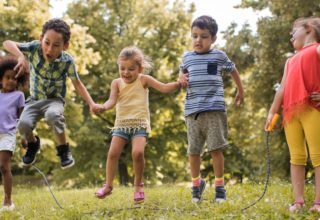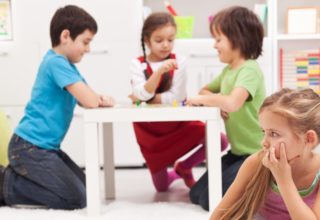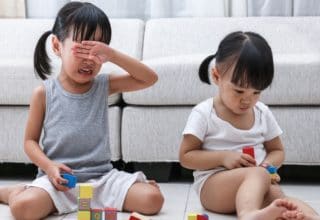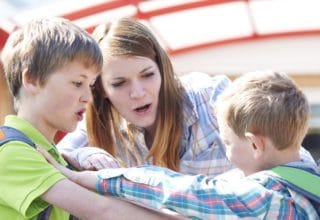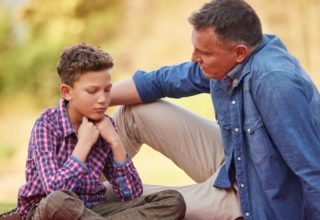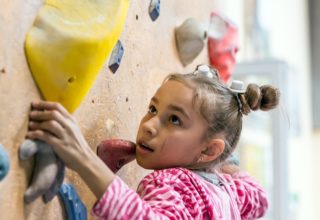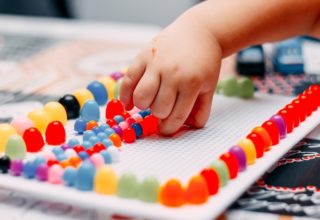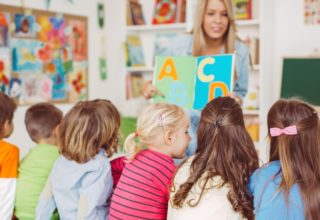Your Playbook for Ages 4 - 5
A curated roadmap by developmental age for navigating the most essential skills and common hurdles of raising children. Evidence-based insights paired with practical tools from early childhood experts.
Social Skills Challenging Behavior Life Readiness Emotional Intelligence Pre-Academics At-Home LearningWhile some children inherently understand how to socially interact with others and are comfortable with basic social skills, others need more...
As parents and teachers of young children, we encounter ‘power play’ in a variety of ways – some children like...
Watching a child turn to you crying for the first time because “A friend said ‘I can’t play’”, is a...
Social exclusion is a main theme in a child’s development and there are many reasons why it happens. Empower your child to...
When your child starts demonstrating behaviors that show they are trying to ‘fit in’ or wants to ‘belong to a...
Tattling is very common but it can be shaped by our responses to their tattling. Teach your child this simple rhyme to work...
Go beyond “How was your day?” Our Top 10 favorite conversation starters can give you insight into what matters to...
Sibling fighting and rivalry is normal and, in most cases, healthy. Learn how to resolve sibling conflict in 5 simple...
Get flustered in the heat of the moment when your children fight? Use these three key phrases to stop sibling...
We can’t end sibling fighting nor force our children to get along, but we can help them recall happy moments...
Siblings fight – it is normal and expected, and you can handle it. But sometimes, stepping outside of the normal...
One of the most frequent complaints we get from parents is around whining. We get it – even as teachers....
Tattling is very common but it can be shaped by our responses to their tattling. Teach your child this simple rhyme to work...
Around the ages of four and five, children begin to tell ‘tall tales’. They may also begin to tell fibs...
At around age 4, you may see all sorts of dramatic language changes – talking back, harsh tones of voice,...
It’s normal to hear your child experimenting with dramatic language at around age 4 (e.g., talking back, harsh tones of...
Understand the difference between discipline and punishment to change a child’s behavior in the future. Let’s focus on creating effective...
Discover how discipline and punishment differ in practice.
Learn how to appeal to your child’s thinking brain and shape their future behavior by instilling discipline (vs. imposing punishment)....
It may feel like a number of impulsive behaviors are seemingly normal for children. But what is ‘normal’? In this...
Brain differences make it hard for a child to control their behavior. Understanding your child’s impulsive behaviors can help you...
Empower your child to manage their emotions and regain control in heated situations with *STOP!*
A breathing exercise to help your child move through the rocky moments in their day. Easy to do and remember....
Including your child in their own learning process about how to self-regulate is empowering and long-lasting. Here’s how everyday tools...
Here’s a practical tool and script to support your child’s self-regulation and emotional awareness – it provides a shared language to signal...
Make a go-to place for your child to find comfort and safety when their internal engines feel out-of-sorts. Whether you...
Try having ‘Family Agreements’ instead of having ‘rules’. Family Agreements can be powerful yet simple tools for encouraging baseline behavioral...
We may have grand intentions when it comes to involving our kids in chores. But how do you know which...
While we may agree that it is important to speak about issues of race and racism, these layered and personal...
Parents are often unsure of how to talk to young children about race. But it is real and it is...
Helpful phrases and scripts to respond to your child when they ask about other children’s challenges or about a child...
Speaking with a child about death is an important, impactful, and often dreaded, teachable moment. Whether prompted by an actual...
There are times when it becomes necessary to speak to children about people in their lives who are very sick....
Keep your child safe from danger and empower them to be safe. Teach your child to protect themselves with important...
Answers to our most popular questions on a heavy subject. From “How do I explain…” to “How do I teach…”...
Community engagement with little ones is filled with layers of good intentions and ambitious learnings. It may take effort, but...
Learn why it is important for your child to be able to identify their emotions, and help them build their...
A simple tip sheet for how to praise your child. Something more than “Good job” or just commenting on process and...
The benefits of mindfulness and how it can help your child thrive. How to naturally and authentically infuse mindfulness into...
Help your child to control their thoughts by making Mindful Minutes a routine. Your step-by-step guide on why, how and...
Learn at what age you should expect that your child can practice skills without prompting and strategies for encouraging your...
*Yet* – Three letters that may change your child’s outlook on life, even among the youngest learners. Learn how the...
Let’s double-down on how to translate *growth mindset* into something tangible with your child. We’re focusing on how to teach...
Any opportunity for a fresh start to refocus and reset (the New Year, the start of the academic school year,...
“Gratitude is not just a feeling outside your control that arrives willy-nilly. It’s more like a radio channel: you can...
Is writing letters backwards OK, or is it an early warning sign of a learning difference? Let’s tackle this very...
Learning to write is a hallmark in a child’s education journey. It empowers them to express themselves and their talents....
Little hands often struggle to hold a pencil, especially when their muscles need some building. Fortunately there are many fun...
Sometimes, a child may have an efficient grasp and sufficient hand strength, but their handwriting strokes still do not produce...
When all the other pieces – like grasp and strength – are in place, it may be time to practice....
If a child is too forceful with their grasp, the pressure used will lead to quick fatigue. To help prevent...
Increase critical thinking and curiosity when you read aloud. Take story time to a new level.
How is your child dealing with words they can’t read? Here’s an observation tool that can help inform how your...
If you’re looking for a didactic list, here’s a theoretical, academic sequence for teaching your child to read. Just remember...
Your child may not want to learnt to read – *yet*. It’s completely normal and natural. Reading is hard. Reading...
“Is my child ready for Kindergarten? What does that even mean?” Here’s my high-level perspective as a parent + teacher...
“I think I have a sense for Kindergarten readiness, now how can I support my child to get there?” Keep...
ABCs, colors, numbers, sight words…parents have heard of the ‘push-down’ of academic skills – that Kindergarten has a lot of...
Kindergarten is a meaningful adjustment – for parents too. We’ve got simple tips for parents for a not-so-simple transition –...
It’s hard to know what you don’t know as your child embarks on their learning journey and enters Kindergarten. Sure,...
Language and scripts parents can use in their back-to-school conversations with children during this Covid-19 pandemic. Plus, answers to common...
How to structure the day at home with your child, specifically extended time periods at home is hard. Here’s our...
How to structure the day at home with your child, specifically extended time periods at home. Smart tips and a...
Your go-to schedule and plan for balancing play, learning and structure for large amounts of time with your child (i.e.,...
